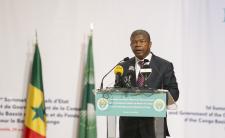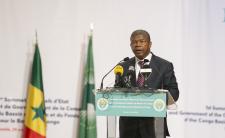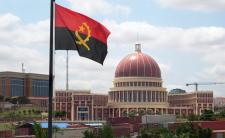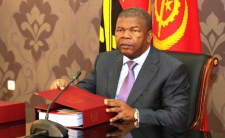Introduction
The Republic of Angola is located in Western Africa, bordered by the Republic of the Congo and the Democratic Republic of the Congo on the north and northeast, by Zambia in the southeast, by Namibia on the south, and by the Atlantic Ocean on the west. Angola covers over 1.2 million square kilometres and is home to more than 13 million people. The majority of Angolans live in urban centres, and the capital of Luanda contains 4.5 million people alone. The population is fairly diverse. While the largest ethnic group is the Ovimbundu, there are also groups of Kimbundu, Mbundu, Lunda-Tchokwe, Nganguela, Bakongo, Europeans, and mestico (those of mixed native African and European heritage). Most Angolans practice indigenous belief systems, though there is also a strong Christian community. While it is rich in resources and is one of Africa’s largest oil exporters, Angola is one of the world’s poorest countries and is still recovering from a 27 year civil war dating back to its independence from Portugal that ended in 2002.
Constitutional developments
The area known today as Angola was once divided between many regional kingdoms and indigenous tribes of hunter-gathers, but when the Portuguese arrived in 1483, they began exploiting the area and its people to support its other colonies in Asia and the Americas. Many Angolans were shipped to other countries to be used as slaves. The Portuguese were not very interested in establishing an actual colony in the area, but missionaries were active throughout the region. As a result, over 20 new kingdoms emerged during the 18th century, seeking to profit from the slave trade. Portuguese interests began to shift, however, when it banned slave trafficking in 1836. Hoping to use the area as a trading link between Europe and its colonies in the Indian Ocean, Portugal began to establish a more permanent presence. Its jurisdiction over Angola was established at the Berlin conference between the European colonial nations in 1884. Portugal’s presence was never very dominating, however, as most settlers were criminals sent there to serve their sentences, and they confined themselves mainly to the coasts. Under Antonio Salazar’s New State military government in Portugal from 1932 to 1968, Angola was subjected to harsher rule, leading to the rise of nationalist sentiment. The three main nationalist groups were formed during this period, the MPLA in 1956, the FNLA in 1958, and UNITA in 1966. These groups participated in an armed resistance which eventually forced the Portuguese to hold a four-party conference between themselves and the nationalists in order to form an independent Angolan government. This conference resulted in the Alvor Accord of January 1975 which provided for a transitional government tasked with writing a new constitution and elections to be held the day after the country declared independence. While independence was declared on 11 November 1975, the elections never took place as the three nationalist groups struggled for power.
On the actual day of independence, it was the Marxist MPLA which held the capital. To solidify their hold on power, they imposed a new constitution based on Marxist-Leninist principles and founded a one-party state. The other parties retreated into the countryside and began a 27 year civil war that would decimate Angola’s economy and population. While the FNLA gave up its armed struggle, UNITA and the MPLA continued to fight until 2002, with the former controlling the countryside and the latter controlling the cities. During this period, the constitution was revised several times to give the MPLA a more firm grip on power and reaffirm socialist goals. However, the most significant amendment occurred in 1992, enabling a more democratic government and opening the door to multi-party elections held that same year. While the fighting resumed shortly after these elections were held, a peace accord was finally signed in 2002 and the re-unified country set about drafting a new constitution, approved on 21 January 2010 by the National Assembly of Angola.
2010 Constitution
The 2010 Constitution established a multi-party presidential regime. The new constitution was drafted by a group of parliamentarians, advised by experts and a public consultation period, but UNITA claimed the process was flawed because the vast majority of the drafters were from the MPLA, in keeping with their parliamentary majority won in 2008. Many of these opponents also claim that the constitution is merely a way to extend the power of the current President, Jose Eduardo dos Santos, who has been ruling Angola since 1979, after the death of Agostinho Neto, the country’s first President. In addition to the office of the President, the Constitution also established a unicameral Parliament and a judicial branch headed by a Supreme Court and Constitutional Court.
Executive Branch
The President, under the 1992 constitutional amendments, was directly elected by the people, but the 2010 constitution allows the majority party in the Parliament to select the President who is normally the head of their party. While the Dos Santos’ MPLA won a landslide victory in the 2008 parliamentary elections and presidential elections were anticipated for 2009, Dos Santos cannot be removed under the new constitution until the 2012 parliamentary elections, despite the fact that his previous 30 years in office far exceed the 10 year limit imposed by the constitution. There is now the possibility that Dos Santos will be able to remain President for an additional 10 years, assuming his party maintains control of the Parliament. The Parliament also has the ability to remove the President, but this must be approved by the Supreme or Constitutional Courts.
The presidential powers under the new constitution are quite extensive. As the Head of State, it is the President’s duty to appoint a Vice-President and the Council of Ministers to aid him in his duties. The President has vast appointment powers, extending to the judges of the Constitutional Court, Supreme Court, and other courts as established under the Constitution, as well as the members of the Supreme Judicial Council. He also has the power to appoint the Attorney General, the Governors of the National Bank of Angola, and the Provincial Governors. The President may also call referendums, declare war and peace in consultation with the Parliament, grant pardons, award decorations and honours, and preside over the Council of the Republic. As the Chief Executive, the President has the power to define and direct national policy, executed by the Council of Ministers, and to enact the laws passed by the Parliament. He may also initiate legislation and request the power to legislate from the Parliament. As the international representative and Commander-in-Chief of the Armed forces of Angola, the President also has the power to define and direct foreign policy, ratify treaties, appoint and accredit ambassadors, and control the appointment, discharge, and promotion of military officers as the head of the National Security Council.
The President is assisted by three additional bodies: the Council of Ministers, the Council of the Republic, and the National Security Council. The Council of Ministers is appointed by the President to aid him in the formulation and execution of national policy. It may address matters concerning government policies and their execution, legislative proposals, presidential legislation, national planning instruments, presidential regulations, international agreements which require the approval of the President of the Republic, the adoption of general measures required to execute the governance programme of the President of the Republic, and any other matters submitted for the consideration of the President of the Republic. The Council of the Republic, presided over by the President, is an advisory body. It is comprised of the Vice-President, the President of the Parliament, the President of the Constitutional Court, the Attorney General, former Presidents who have not been removed from office, the leaders of the political parties and coalitions of political parties represented in the Parliament, and ten citizens appointed by the President. The National Security Council advises the President on matters concerning national security policy, strategy, and administration. Also presided over by the President, the National Security Council consists of the Vice-President, the President of the Parliament, the President of the Constitutional Court, the President of the Supreme Court, the Attorney General, the Ministers of State and Ministers nominated by the President, and any others nominated by the President.
Legislative Branch
The Parliament, also called the National Assembly, is unicameral and its members are elected by a direct vote: 130 at the national level and 5 from each province. The National Assembly is responsible for approving constitutional amendments, passing legislation, granting the President the authority to legislate , approving the state budget, granting amnesties and pardons, and pronouncing on the possibility of the President declaring war, peace, a state of emergency, or a referendum. The National Assembly also approves any ratification of, signing of, or withdrawal from treaties and international agreements. It may also initiate impeachment proceedings against the President. In the realm of national security, the Parliament has very limited powers. It has the ability to analyze and debate a declaration of war or state of emergency, the granting of state funds, and the passage of legislative decrees by the President, but does not have the power to address policy or strategy. The National Assembly also has some institutional checks on the judiciary in that it elects judges to the Constitutional Court, Supreme Judicial Council, and the Ombudsman. While the President is given some powers to legislate, only the National Assembly may legislate on matters regarding fundamental rights, elections, definitions of crimes and nationality, and the organization of the judiciary. The Assembly has relative competence to legislate regarding public companies and institutions, public finances and the banking system, property, and the basic elements of national education, health, and social security.
Judicial Branch
The two highest courts of Angola are the Supreme and Constitutional Courts. The Supreme Court is a court of common jurisdiction, making it the highest appeals court in all cases unrelated to the constitution. Its members are appointed by the President on the recommendation of the Supreme Judicial Council. The President and Vice-President of the Court are also appointed by the President from three candidates chosen by two-thirds of the other judges. The Constitutional Court is comprised of 11 members serving 7 year terms: 4 judges nominated by the President, including the President of the Court, 4 judges elected by the National Assembly by a two-thirds majority, including the Vice-President of the Court, 2 judges elected by the Supreme Judicial Council, and 1 judge elected by the other judges. This Court is responsible for assessing the constitutionality of any rules and other acts of the state, providing a prior review of the constitutionality of the laws of parliament, exercising jurisdiction in other legal and constitutional, electoral and political matters, and assessing constitutional appeals from the lower courts.
The High Council of the Judicial Bench, or the Supreme Judicial Council, is tasked with maintaining judicial independence and integrity. The High Council manages and disciplines judges. In pursuance of this duty, the High Council may assess the professional ability of judges and take disciplinary action against them, propose the appointment of judges to the Constitutional Court, order investigations, inspections and enquiries into the legal services, and propose the necessary measures required to ensure their efficiency and improvement. In addition, the High Council may propose the appointment of members of the Bench to the Supreme Court, and appoint, place, transfer and promote judges. The President of the Supreme Court presides over the High Council and is joined by 3 jurists appointed by the President, at least one of which must be a judge, 5 jurists appointed by the National Assembly, and 10 judges elected by judges by their peers.
System of government under 2010 Constitution
Timeline
| 1483 | Portuguese arrive and begin exporting slaves from Angola to its other colonial possessions |
| 1836 | Portuguese ban slave trafficking and refocus efforts in Angola on trade |
| 1884 | Berlin conference between the European colonial powers establish Portuguese jurisdiction over Angola |
| 1932 | Antonio Salazar forms New State military government in Portugal |
| 1956 | MPLA nationalist group formed |
| 1958 | FNLA nationalist group formed |
| 1961 | Armed resistance by guerrilla nationalist groups begins |
| 1966 | UNITA nationalist group formed and joins armed resistance movement |
| January 1975 | Alvor Accord provides for a transitional government tasked with writing a new constitution and elections to be held on 12 November 1975 |
| 11 November 1975 | The MPLA declares Angola independence under their leadership and imposes a socialist constitution, the other nationalist groups retreat the country side and begin a civil war |
| 1992 | Constitutional amendment creates multi-party democratic system, resulting in new elections, but fighting resumes due to conflict over the results |
| 2002 | Peace declared between the MPLA and UNITA, ending the 27 year civil war |
| 21 January 2010 | National Assembly approves new constitution |
Bibliography
- United States. CIA World Factbook: Angola. , 2011. Web. 8 Jul 2011.
- "Angola Country Profile." 07/06/2011. BBC News. Web. 8 Jul 2011.
- Federal Research Division, Library of Congress. Country Studies: Angola. 2010. Web. 8 Jul 2011.
- Foreign & Commonwealth Office. Angola. 2010.; Web. 8 Jul 2011.
- Republic of Angola National Assembly. Constitution of the Republic of Angola. 2010. Web. 8 Jul 2011.
| Branch | Hierarchy | Appointment | Powers | Removal |
|---|





Share this article